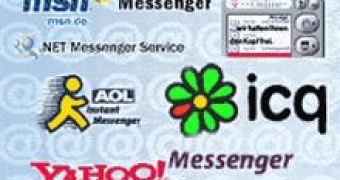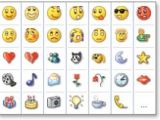We're living in a world that is becoming, with every passing day, more and more dependent on computers, the Internet, communications, and so on. The "info-schooling" has reached record levels, since there are quite a lot of cases of kids who first learn how to type or use the mouse and then to write by hand. And that's exactly the generation I'll speak about in this article, those young people for whom Instant Messaging (IM) clients, either from AOL, MSN, Yahoo, Google or Skype, have become the most important type of communication and, at the same time, the most important social-networking tool.
I was taking a walk the other day, and I happened to cross paths with two teenagers. Usually, I don't really listen to what other people speak about on the streets (I'm kind of tired of the same old discussions about football, politics, women and neighbors), however I couldn't help overhearing what those girls were saying to each other. "Lol, sis", said the first one, "have you heard that dude?" "No, what'd he say?" replied, quite curious, the second one.
- He said he just loves your avatar picture! - Omg, omg... he didn't... no way... you just have to copy paste it, I have to see it to believe it. - Oki, np. - Anything else or just that? - Nope, he said also that he'll go online tonight and he'll buzz ya, so you'll be able to talk in private.
This conversation made me think quite seriously about the influence these means of communication have on young people. It seems to me that, step by step, all these abbreviations (most of them of actual words from the English language) are slowly turning into a completely new language, a language familiar just to those who use IM clients on regular basis. It's some sort of "secret code", a code that parents don't know or understand, through which teenagers are able to communicate a lot faster. The problem is that the members of the "Messenger generation" are starting to change their own native language, despite their teachers' efforts. And this seems to have become quite an international phenomenon, which is not yet visible on a large scale, but as online communications develop (either those carried out through IM clients, or those taking place in the social networking sites' chat rooms), it will clearly grow to a level we can't even imagine yet.
This is just one point of view. But this can be considered from many perspectives and, in the case of the "English/Messenger" language, there's also the point of view of the people who actually use it. They see it as something completely normal, something that cannot be otherwise, and that's why they're also transferring it into real life. And I'll give you a very simple example, so you'll understand exactly what I'm talking about. Try to remember when was the last time you've heard somebody say "lol" out loud, and then start laughing.
IM clients wouldn't have that special charm without the emoticons, those faces who try (and more or less succeed) to express a state of mind as close as possible to that of the user. Whether we're talking about the old, eternal "smiley face" (a.k.a. :), although it's not as popular as it used to be, according to a friend of mine, a great "messenger-girl"), or about others, as complicated and funny as possible (and sometimes more, since there is a certain plugin for Yahoo Messenger which displays porn-emoticons), these symbols have conquered the entire Internet, and it's quite clear that we're talking about a presence that will stay on as long as online communications do.
Quite obviously, the opinions regarding the "IM" subject are quite diverse, and many people (especially those older than 25) think that these abbreviations that form the "messenger language" are something quite difficult, and that they can make themselves understood a lot easier by writing coherent phrases. On the other hand, there are an equally large number of people who think that this language saves them some time, and that's the reason why they adopt it.
Which will be the future of this nascent language? Is it just a phase young people are going through, which will disappear in time, or will it turn, at some point, in a new language, the language of the Internet? It's pretty hard to tell, but we'll probably have an answer soon enough, considering the fact that the current "messenger generation" is about to become adult.

 14 DAY TRIAL //
14 DAY TRIAL // 


